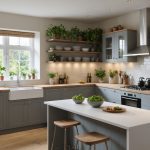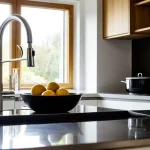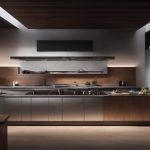Key elements of minimalist kitchen design in the UK
Minimalist kitchen principles center around simplicity, functionality, and maintaining uncluttered spaces. In the UK, these principles shape kitchen designs by prioritizing clean lines and practical layouts that optimize every inch of space. Unlike more extravagant international styles, UK kitchens often emphasize efficient storage solutions that hide appliances and tools, contributing to a sleek, distraction-free environment.
UK kitchen design applies minimalist ideals by maximizing practicality within often compact footprints. Cabinets tend to be handleless or integrated seamlessly into walls to sustain a smooth visual flow. Materials are chosen not only for aesthetics but also for durability and easy maintenance, supporting day-to-day functionality. This emphasis on usability caters to the typical UK home, where kitchens must combine cooking, dining, and socializing zones without overcrowding.
In the same genre : How are UK kitchens maximizing small spaces with innovative storage solutions?
A distinct difference between UK minimalist kitchens and their international counterparts lies in how space constraints influence design choices. While global styles may embrace large islands or expansive countertops, UK minimalist kitchens prioritize multi-purpose items and ingeniously concealed storage to keep surfaces clear. This approach reflects a balance between modern kitchen aesthetics and practical living demands common across UK households.
Popular features shaping minimalist UK kitchens
Minimalist kitchen features play a crucial role in defining the look and functionality of UK kitchen design. Colour palettes typically lean toward whites, neutrals, and monochromes, creating a bright, clean, and calming atmosphere. These shades support minimalist kitchen principles by emphasizing simplicity and helping spaces appear larger and more open.
Also to see : How Might the Latest Kitchen Innovations in the UK Impact Our Daily Cooking Routines?
Materials are carefully selected to balance aesthetics and function. Natural materials like wood and stone are commonly used alongside engineered composites and metals, adding texture without detracting from the uncluttered look. For example, stone countertops paired with matte wood cabinetry achieve a tactile contrast while maintaining the minimalist ethos.
Open-plan layouts are increasingly popular, reflecting kitchen trends that blend cooking, dining, and living areas into seamless, multifunctional spaces. This integration of open-plan layouts allows the minimalist kitchen to support social interaction while preserving clear sightlines and a sense of spaciousness. By reducing barriers, these designs highlight the core minimalist principle of uncluttered space.
In summary, minimalist kitchen features in UK interiors combine restrained colour schemes, well-chosen natural and engineered materials, and open layouts. Together, they embody modern kitchen aesthetics focused on elegance through simplicity and functional design.
Influential brands and popular products in the UK minimalist kitchen market
UK kitchen brands have played a pivotal role in shaping the modern minimalist kitchen aesthetic. Leading suppliers prioritize clean lines, seamless integration, and high-quality materials that align with minimalist kitchen principles. Brands known for innovation focus on delivering products like handleless cabinets, which eliminate visual clutter by removing traditional hardware, preserving smooth surfaces synonymous with minimalist styles.
Integrated appliances are another hallmark of UK minimalist kitchens. These smartly concealed devices blend effortlessly with cabinetry, enhancing the sense of an uncluttered space while maintaining full functionality. Many UK kitchen suppliers provide custom-built options to perfectly fit compact layouts, a key consideration given the typical spatial limitations in UK homes. This bespoke approach ensures every element contributes to practical use without sacrificing design integrity.
Concealed storage solutions also rank highly in minimalist kitchen products. By hiding everyday items behind flat-panel doors or within cleverly designed drawers, these features keep countertops clear and support the minimalist ethos of simplicity and efficiency. Recent high-profile kitchen renovations across the UK highlight the success of this strategy, showcasing spaces where minimalist principles meet everyday usability.
In summary, prominent kitchen brands UK combine advanced design with practical features such as handleless cabinets, integrated appliances, and concealed storage. These elements not only uphold minimalist kitchen principles but also address the specific needs of UK homeowners seeking modern kitchen aesthetics tailored to their living environments.
Impact on lifestyle, functionality, and daily living
Adopting minimalist lifestyle principles in UK kitchens significantly enhances daily living by fostering cleaner, more efficient environments. Homeowners benefit from a reduction in visual clutter, which creates a sense of spaciousness even in smaller spaces typical of UK homes. This improved clarity not only makes kitchens feel more inviting but also eases mental load by minimizing distractions during cooking and other activities.
Functional kitchen design underpins these benefits by prioritizing ease of use and streamlined workflows. Thoughtfully planned layouts ensure that essential tasks flow smoothly with minimal movement, optimizing time spent in the kitchen. For UK homeowners, this means their kitchens support multifunctional needs—cooking, dining, and socializing—without overcrowding or disorganization.
Many UK homeowners adjust to minimalist kitchens by embracing concealed storage and integrated appliances. These features reduce countertop clutter, making cleaning quicker and maintenance simpler. The psychological impact is equally notable: fewer visible items contribute to a calming atmosphere, which can improve overall wellbeing and satisfaction with the home environment.
In summary, minimalist kitchen principles translate into practical lifestyle improvements for UK homeowners. Cleaner spaces combined with functional layouts enhance everyday usability while fostering a peaceful, spacious feeling that aligns with modern living demands.
Expert perspectives and emerging minimalist trends
Insights from kitchen design experts in the UK highlight an evolving landscape for minimalist kitchen trends. Architects and designers emphasize the growing demand for sustainable materials, such as reclaimed wood and low-impact composites, which align with minimalist kitchen principles by promoting environmental responsibility alongside aesthetics. This shift addresses both consumer values and stricter building regulations, encouraging UK kitchen renovation projects to balance style with sustainability.
Another significant trend experts note is the integration of smart technology into minimalist kitchens. Intelligent appliances and automated lighting systems are becoming standard features, allowing homeowners to maintain the uncluttered look that defines minimalism while enhancing functionality. For example, smart refrigerators that monitor inventory or touchless faucets increase convenience without disrupting the sleek, seamless surfaces favored in UK kitchen design.
Looking ahead, experts predict that modern kitchen aesthetics in the UK will continue to embrace these innovations while refining minimalist principles further. Emphasis on adaptable spaces that can serve multiple functions without compromising design clarity is expected to grow. The future of UK kitchen renovation will likely feature modular components and flexible layouts that respond to lifestyle changes, reinforcing minimalist ideals of simplicity and practicality.
Overall, UK kitchen design experts advocate for a minimalist approach that incorporates sustainability and technology, ensuring future kitchens remain both beautiful and highly functional. This evolving trend promises to keep minimalist kitchen principles at the forefront of UK interior design innovation.




